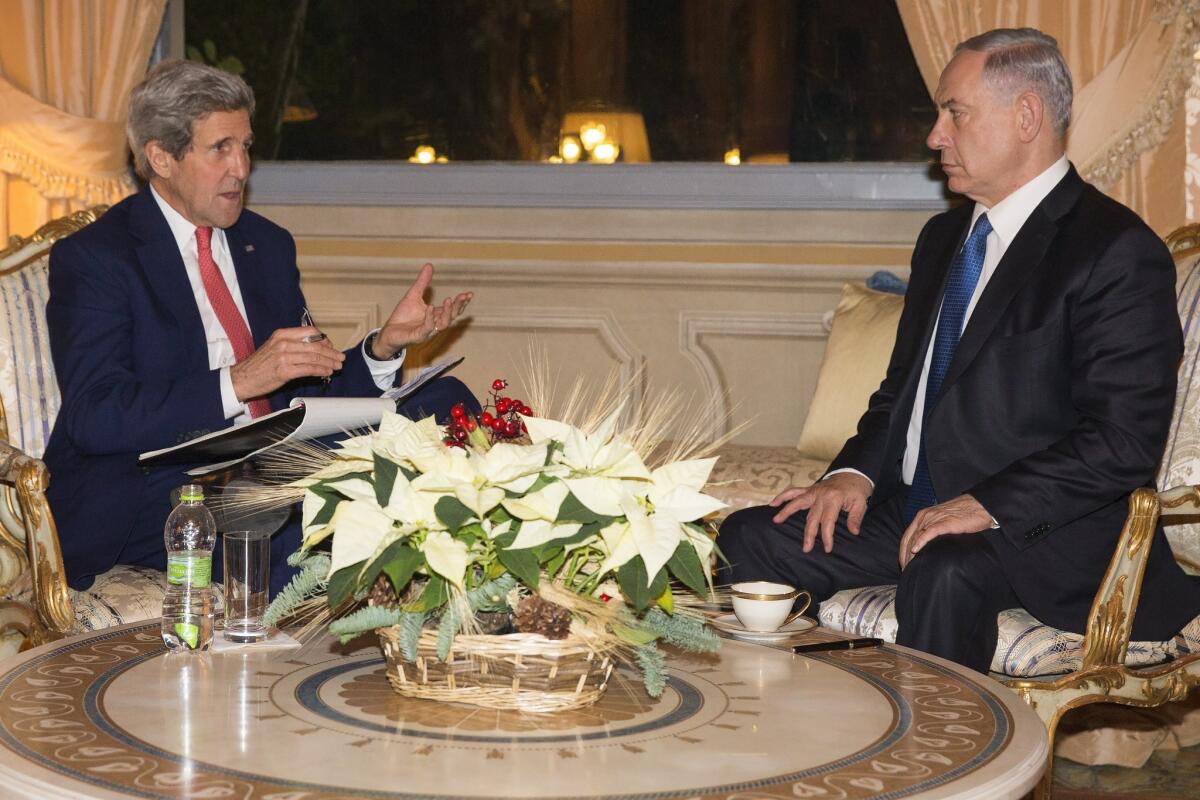Netanyahu, in Rome, tries to forestall Palestinian statehood drive

- Share via
Reporting from Jerusalem — Israeli Prime Minister Benjamin Netanyahu held a series of diplomatic consultations in Rome on Monday, attempting to build opposition to a planned Palestinian appeal to the United Nations for statehood.
Netanyahu met with Italian Prime Minister Matteo Renzi and Secretary of State John F. Kerry. The State Department said before the meeting that the two intended to discuss “a number of issues,” including recent developments in Israel, the West Bank, Jerusalem and the region.
However, the immediate topic topping the leaders’ agenda is the Palestinian Authority’s bid to the U.N. Security Council to set a two-year deadline for an Israeli withdrawal from the West Bank.
“We want a clear and specific resolution for a Palestinian state on the 1967 borders, with Jerusalem as its capital,” chief negotiator Saeb Erekat told news media after the Palestinian leadership convened Sunday night.
Reportedly, the Palestinians plan to approach the Security Council this week. Jordan, a nonpermanent member of the council, would most likely submit the draft on the Palestinians’ behalf, and a vote could be held as early as Wednesday.
Ahead of Monday’s meetings, Netanyahu vowed the measure would not pass.
“We will not accept attempts to dictate to us unilateral moves on a limited timetable,” he said at Israel’s airport. “In a reality in which Islamic terrorism is reaching out to all corners of the globe, we will rebuff any attempt that would put this terrorism inside our home,” said Netanyahu, who rejects demands for withdrawal to the pre-1967 borders as security threat.
In a briefing last week, State Department spokeswoman Jen Psaki said the U.S. continues to support Palestinian statehood through negotiations but didn’t directly answer whether the U.S. would support or oppose proposals brought to the UN.
“Our belief is that a two-state solution, an agreement between the two parties, is the best way to achieve peace in the region,” Psaki said. “But the fact is that there are a number of countries out there that want to see action at the U.N. … so this is an appropriate time to have the discussion.”
France recently proposed its own plan to restart the peace process that includes a Security Council resolution with a two-year deadline for an agreement, and an international conference.
France is among the growing list of European countries whose lawmakers are voting to recognize Palestinian statehood.
In a statement Sunday, the Palestinian Foreign Ministry said recognition by European parliaments would put pressure “on reluctant governments, which will in turn pressure the entire international community,” including the United States.
These and other international moves, said the statement, come as the Palestinian leadership is “convinced that the negotiations path in its current form is not effective” for achieving timely statehood.
Erekat said he too would meet with Kerry in Europe this week to discuss the issue.
The diplomatic coordination over the Palestinian drive comes as Israel plunges into an election campaign in which Netanyahu is seeking a fourth term as prime minister. The election will be in March.
The campaign could bring back into focus the Israeli-Palestinian conflict and the prospects for a two-state solution. In recent years, many Israelis have been more concerned with socioeconomic issues than with the permanent resolution of the conflict.
Still, the Palestinian issue -- and all related diplomacy, settlements, territorial concessions and security issues -- remains the central fault line dividing left and right, and will factor into the campaign.
Sobelman is a special correspondent.
More to Read
Sign up for Essential California
The most important California stories and recommendations in your inbox every morning.
You may occasionally receive promotional content from the Los Angeles Times.










